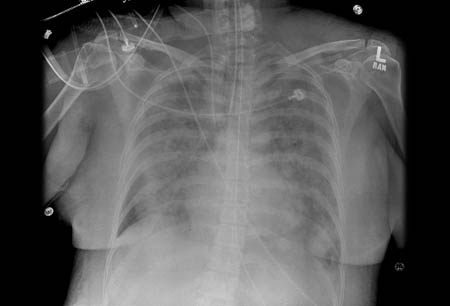Summary
Definition
History and exam
Key diagnostic factors
- ingestion of 150 mg/kg or more, or 6.5 g or more, of aspirin or aspirin equivalent
- ingestion of methyl salicylate (oil of wintergreen)
- ingestion of bismuth subsalicylate
- self-harm or suicide attempt
- children age 3 years or younger, and adults age 70 years or older
- unknown toxin ingestion or exposure
- abnormal behavior
- nausea, vomiting, hematemesis, epigastric pain
- fever and diaphoresis
- shortness of breath
- tachypnea, Kussmaul respirations
- tinnitus and/or deafness
- malaise and/or dizziness
- movement disorders, asterixis, stupor
- confusion and/or delirium (irritability, hallucinations)
- coma and/or papilledema
- seizures
- rales plus low oxygen saturation
Other diagnostic factors
- volume depletion
- skin rash
Risk factors
- ingestion of 150 mg/kg or more, or 6.5 g or more, of aspirin or aspirin equivalent
- ingestion of methyl salicylate (oil of wintergreen)
- ingestion of bismuth subsalicylate
- history of self-harm or suicide attempt
- children age 3 years or younger, and adults age 70 years or older
Diagnostic tests
1st tests to order
- ABG
- serum electrolyte panel
- serum salicylate level
- serum BUN and creatinine
- serum ketones
- blood glucose
- CBC
- serum LFTs
- serum PT, activated PTT, INR
- toxicology screen
- chest x-ray
- ECG
Tests to consider
- echocardiogram
- head CT scan
- EEG
Treatment algorithm
asymptomatic: without criteria for emergency department evaluation
asymptomatic: with criteria for emergency department evaluation
symptomatic
Contributors
Expert advisers
Chris Hoyte, MD
Medical Toxicology Fellowship Program Director
Rocky Mountain Poison and Drug Safety
Denver
Professor
Department of Emergency Medicine
University of Colorado School of Medicine
Aurora
CO
Disclosures
CH declares that he has no competing interests.
Eric Lavonas, MD, MS
Attending Physician
Department of Emergency Medicine and Rocky Mountain Poison and Drug Safety
Denver Health
Denver
Professor
Department of Emergency Medicine
University of Colorado School of Medicine
Aurora
CO
Disclosures
EL is an author of a reference cited in this topic.
Acknowledgements
Dr Chris Hoyte and Dr Eric Lavonas would like to gratefully acknowledge Dr Kathryn A. Koch, a previous contributor to this topic.
Disclosures
KAK declares that she has no competing interests.
Peer reviewers
Colin A. Graham, MBChB, MPH, MD, FRCSEd, FRCSGlasg, FIMCRCSEd, FCCP, FCEM, FHKCEM, FHKAM
Editor
European Journal of Emergency Medicine
Professor of Emergency Medicine
Chinese University of Hong Kong
Hong Kong
People's Republic of China
Disclosures
CAG is the editor of the European Journal of Emergency Medicine and receives an annual honorarium from Wolters Kluwer Health, the journal's publishers.
Gerald F. O'Malley, DO
Director
Division of Research
Department of Emergency Medicine
Albert Einstein Medical Center
Philadelphia
PA
Disclosures
GFOM declares that he has no competing interests.
Paul Wax, MD
Clinical Professor of Surgery (Emergency Medicine)
University of Texas Southwestern Medical Center
Dallas
TX
Disclosures
PW is an author of a reference cited in this topic.
Peer reviewer acknowledgements
BMJ Best Practice topics are updated on a rolling basis in line with developments in evidence and guidance. The peer reviewers listed here have reviewed the content at least once during the history of the topic.
Disclosures
Peer reviewer affiliations and disclosures pertain to the time of the review.
References
Key articles
Palmer BF, Clegg DJ. Salicylate toxicity. N Engl J Med. 2020 Jun 25;382(26):2544-55. Abstract
Chyka PA, Erdman AR, Christianson G, et al. Salicylate poisoning: an evidence-based consensus guideline for out-of-hospital management. Clin Toxicol (Phila). 2007;45(2):95-131.Full text Abstract
American College of Medical Toxicology. Guidance document: management priorities in salicylate toxicity. J Med Toxicol. 2015 Mar;11(1):149-52.Full text Abstract
Dargan PI, Wallace CI, Jones AL. An evidence based flowchart to guide the management of acute salicylate (aspirin) overdose. Emerg Med J. 2002 May;19(3):206-9.Full text Abstract
Reference articles
A full list of sources referenced in this topic is available to users with access to all of BMJ Best Practice.

Differentials
- Diabetic ketoacidosis
- Dementia
- Pneumonia
More DifferentialsGuidelines
- Salicylates poisoning
- Salicylate poisoning: an evidence-based consensus guideline for out-of-hospital management
More GuidelinesCalculators
Anion Gap
More CalculatorsLog in or subscribe to access all of BMJ Best Practice
Use of this content is subject to our disclaimer